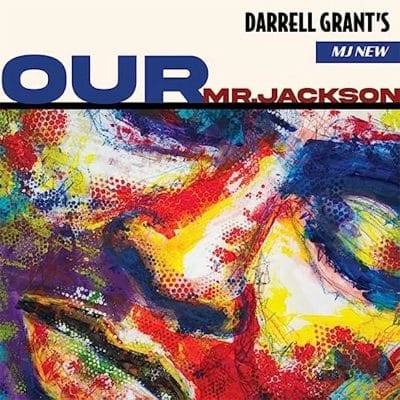Darrell Grant’s MJ New Our Mr. Jackson
 Darrell Grant’s MJ New
Darrell Grant’s MJ New
Our Mr. Jackson
Lair Hill
For whatever reasons, today we seldom hear about one of the longest running groups in jazz, the Modern Jazz Quartet, dubbed MJQ. Led by pianist John Lewis with vibraphonist Milt Jackson, bassist Percy Heath, and drummer Connie Kay, (who replaced Kenny Clarke), they were formed in 1952 and played as a unit for 45 years. They were pioneers of the integration of what became known as Third Stream music, merging classical music with jazz, thereby crossing racial boundaries. Pianist Darrell Grant was invited by the Portland jazz Festival to plan and perform a tribute concert to the MJQ in 2013 and assembled MJ New with vibraphonist Mike Horsfall, bassist Marcus Shelby, and drummer Carlton Jackson, a fixture in Portland as both a drummer and radio host. Unfortunately, Jackson passed away at the age of 60 in 2021, and this album, recorded in 2018, now becomes a tribute both to the MJQ and Jackson, hence its title, Our Mr. Jackson.
The album though, in the spirit of the MJQ, is not merely a series of covers but instead a mix of Grant originals that incorporate his own classical influences, as well as compositions from the MJQ. He also strove to represent more contemporary forms, citing the jazz renaissance of the ‘90s that brought new harmonics and even modern approaches to chamber music and classical orchestrations. The album is bookended by perhaps the most famous tune in the MJQ catalog, Milt Jackson’s blues, “Bag’s Groove,” given a sprightly, faithful interpretation in the opener with a drummer feature for Carlton Jackson. A brief vamp of the piece closes the album’s twelve tracks. As Grant talks about the MJQ and his own quartet, the emphasis is on contrapuntal lines, explored to a deep extent in John Lewis’ “Versailles,” which also highlights Carlton Jackson’s deft ability to navigate the MJ New through a series of rhythm changes. They also not to the MJQ’s seminal 1956 Prestige release, Django in their arrangement of “Autumn in New York” playing off the two bar introduction and presenting variations thereof throughout the piece. Two period pieces, Ellington’s “Drop Me Off in Harlem” and Mary Lou Williams’ “Cancer” from the “Zodiac Suite” follow. The pristine recording quality allows the listener to focus very clearly on each member of the MJ New, each of whom well represent the elegant music of their forbearers instrumentally.
In the second half of the album Grant veers into slightly different territory beginning with his own original, “Crossing the Bridge: Vanport,” sourced from a suite that Grant wrote soon after moving to Portland from NYC in the late ‘90s. He comments, “Vanport was a company town built by Kaiser Shipbuilding during World War II, and it was an integrated city, even though historically Portland was segregated. But on Memorial Day in 1948 it was destroyed in an historic flood. Everyone had to ‘cross the bridge’ and go back to segregation.” This explains the melancholy, rather solemn tone of the piece, which takes on even greater contrast when compared to a swinging piece like Ellington’s “Drop Me Off in Harlem.”
Grant’s “Viennese Affair” nods to Beethoven’s Fur Elise and Gigi Gryce’s “Minority,” today termed a ‘mashup’ but certainly a third-stream convention. Grant also immerses his quartet directly into classical by adapting Franz Schubert’s “String Quintet in C Major: Adagio” as well as combining the classical with bossa in “Bach to Brazil,” which draws from Bach’s French Suites and Jobim’s “Aqua de Beber.” The quartet gets back to swinging hard on “Surrey with the Fringe on Top.”
Perhaps the flood motif was also on Grant’s mind when he adapted “Wading Through” from Terence Blanchard’s 2007 A Tale of God’s Will: Requiem for Katrina, a testament to the MJ New’s ability to play in a restrained manner while conveying deep emotion. Grant and Horsfall shine especially here. It’s such a gorgeous reading and further evidence of the group’s mastery of interplay and versatility.
It would be surprising and somewhat disappointing if this brilliant performance doesn’t encourage the listener to revisit the originators of this quartet sound, the MJQ.
- Jim Hynes
Buy Us a Cup of Coffee!
Join the movement in supporting Making a Scene, the premier independent resource for both emerging musicians and the dedicated fans who champion them.
We showcase this vibrant community that celebrates the raw talent and creative spirit driving the music industry forward. From insightful articles and in-depth interviews to exclusive content and insider tips, Making a Scene empowers artists to thrive and fans to discover their next favorite sound.
Together, let’s amplify the voices of independent musicians and forge unforgettable connections through the power of music
Make a one-time donation
Make a monthly donation
Make a yearly donation
Buy us a cup of Coffee!
Or enter a custom amount
Your contribution is appreciated.
Your contribution is appreciated.
Your contribution is appreciated.
DonateDonate monthlyDonate yearlyYou can donate directly through Paypal!
Subscribe to Our Newsletter
Discover more from Making A Scene!
Subscribe to get the latest posts sent to your email.













































